In part two of The Courier-Mail’s series on Queensland’s own tennis champion, Robert Craddock looks at the moment touring became all too much for Ash Barty, as she turned her hand to cricket.
WHEN Ash Barty won the 2011 Wimbledon junior singles title she was dubbed the Cinderella of tennis – but there was a twist in the tale.
Cinderella got to the ball. Barty skipped hers and opted for a family barbecue.
A cherished privilege for Wimbledon champions of all levels is an invitation to the Wimbledon Champions Ball but while Novak Djokovic was fastening his black tie and senior ladies champion Petra Kvitova was frocking up in her new blue dress Barty was donning her AIS tracksuit for the flight home.
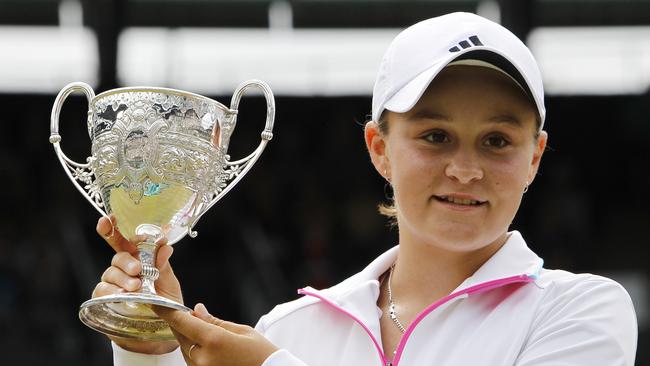
As the other Wimbledon champions were getting ready to head to the Intercontinental Hotel in London’s swanky Park Lane, Barty was heading back to Brisbane, the escape route into the precious bosom of her loving family from Ipswich (“my favourite place in the world’’).
Her new coach Jason Stoltenberg urged her to go to the ball but she declined after being a surprise winner, victorious not simply at her debut tournament at Wimbledon but the first time she had set eyes on the iconic venue.
Her mind was already set on one thing ... home.
Seclusion. Privacy. Anonymity … paradise.
Or so she thought.
LIFE IN THE LIMELIGHT
It was not until she walked through the exit door at the Brisbane international airport that Barty, just 15, learnt the essential truth of old saying that decrees there is only one certainty about fame … it never comes on your terms.
She looked up into the bank of television cameras and smiled sheepishly as if she was not quite sure of what she had done.
It is customary for Aussie sporting champions to arrive home with their trophies conveniently placed in their hand luggage where they can be swiftly extracted for photos but Barty had to admit “I didn’t bring the trophy – it’s in London with my manager.’’
Modest to a fault, Barty’s humility was noted by The Courier-Mail’s report of her arrival but so was her sense of mild discomfort.
“She was polite and gracious while giving the impression she would rather be anywhere but in the media spotlight,’’ the report said.
Long-time Barty watchers look back and identify the junior Wimbledon victory as both a milestone and millstone of equal proportions, the signpost that pointed her away from the simple life she craved into the numbing abyss of endless travel, isolated, soul-less hotel rooms.
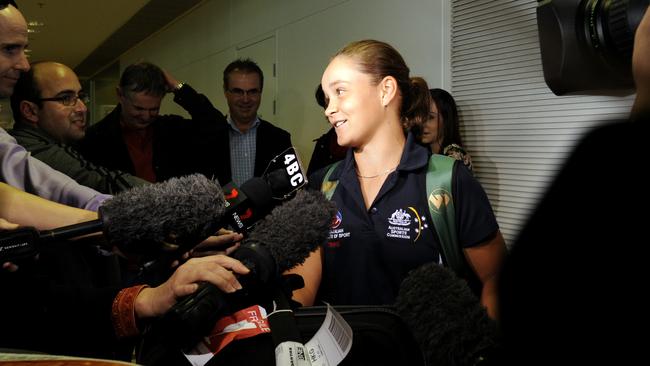
Barty tried to make the rooms homely by unpacking all of her gear but she realised there was only one place like home and that was home itself.
From that point the brutal world of professional sport effectively made her two incompatible people – a teenager in no hurry to grow up and a burgeoning tennis star who had to grow up at breakneck pace to stay afloat in the jungle of competitive tennis.
Her Wimbledon junior title suggested she would be soon ready to face the big girls and if life had simply been a matter of sliced backhands and drop volleys she might have been. But it was everything else that was part of the package that ground her down.
Barty was in her mid-teens but while other children her age were doing grade 11, talking formals, and singing along with chart toppers like Katy Perry’s Roar she was spending a good portion of her life alone in hotel rooms in Birmingham, Mildura, Kuala Lumpur, New York and Paris.
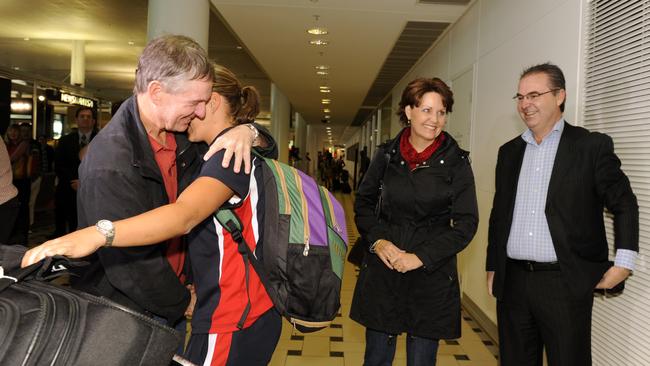
Things became so hectic that, at one point Barty’s parents noted they had seen her less than 40 days a year.
Even those closest to her – like Stoltenberg and Jim Joyce, the sagely mentor who taught her to play and knew her as well as anybody – were concerned she had advanced so quickly her wheels were starting to spin.
“Jason said to me “what do we do?’’ Joyce said.
“And I said ‘mate, does she have to play this much?’’ He said “well, we cannot hold her back. We cannot play juniors any more. She was No 2 in the world juniors so we have to let her face the opens.’’ I told him I thought it was a bit early and he said we cannot hold her back.’’
It was a time that, for a while, robbed her of something far more important than a tennis trophy – her childhood.
THE BRAVEST DECISION YET
Barty moved into a flat at Melbourne’s South Yarra where she lived alone at age 16 cooking for herself with recipes jotted down by her mum.
She never wallows in self pity about her dark days on tour but did drop her guard to News Corp that she cried “more times than not” while overseas without her family and friends.
One time she confessed to crying her way through a match and crying in her coach’s arms.
“I tried to hide it as best I could for as long as I could,” she said.
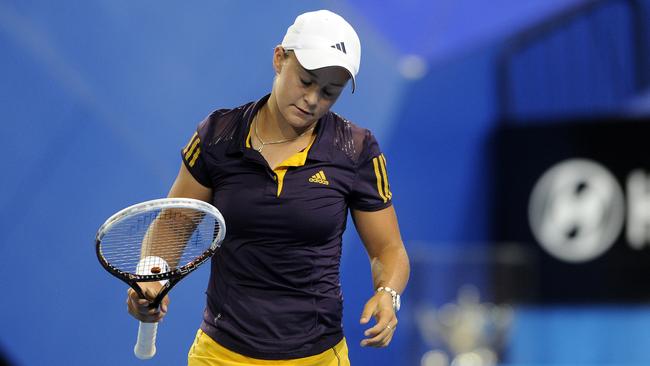
“Some days I felt normal, but others I’d feel I was incapable of anything. It’s never, ever, ever been about the money. If it was, I’d still be gritting my teeth playing tennis.
“At the end of the day, it’s very simple: I just didn’t want tennis to be a job.”
For two years Barty took medication for depression and saw a therapist where they discussed how to manage a string of her “perfectionist’’ traits which included small things like how she had to pack and unpack her bag the same way.
Her decision to seek professional help was strongly endorsed by her father Robert, himself a depression sufferer.
Results wise, it could have been easy to think she was bobbing along nicely in the professional ranks with three Grand Slam doubles finals appearances with Casey Dellacqua before her 18th birthday.
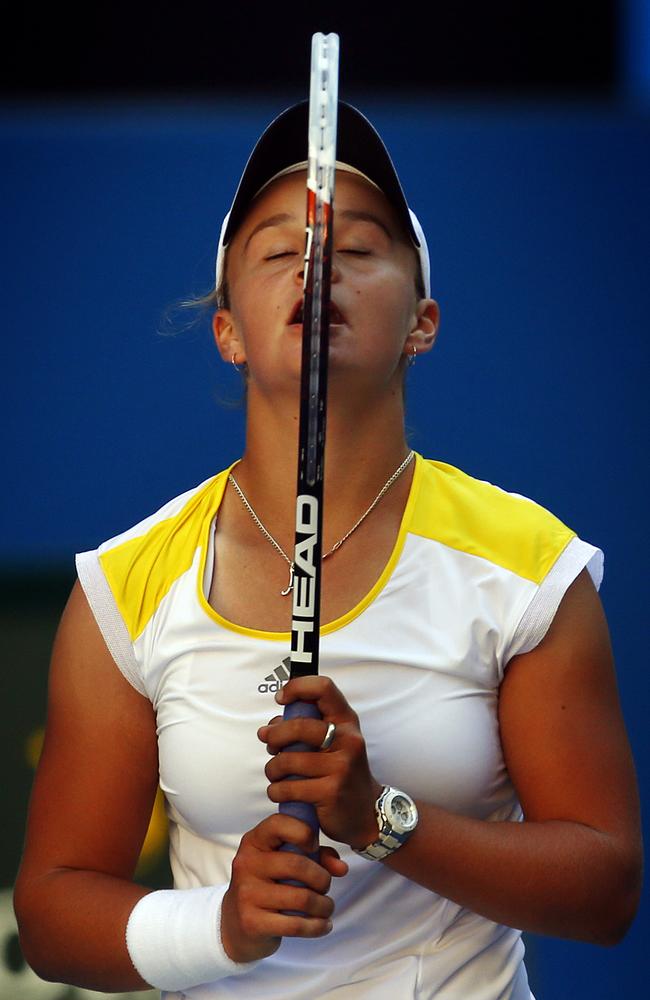
But Joyce, who in her earliest years had steered her away from the high pressure tournament play that so often leads to burnout, could spot the cracks.
“She was very unhappy all of 2014. Even though she was on the circuit and playing in the US Open and Wimbledon she had had enough. She was very upset. She was just cooked through the year. It was a gradual progress. She showed the effects of it in 2013.
“After she won junior Wimbledon everyone got carried away. It was not just the media and Tennis Australia but her own expectation grew. We tried to keep it as level as we could but it was hard. Jason Stoltenberg said she was a victim of her own success.’’
Then finally, in September 2014, a month after her first round exit at the US Open, she shocked the wider tennis world – but not those close to her – by announcing she was taking an indefinite break from tennis.
THE PASSION IS DEAD
Barty packed her tennis gear away and her father was one of several people close to her who thought she would never return to the circuit.
Enough, he thought, may have been enough.
It seemed such a final decision she did not even seek a protected ranking to preserve the world mark of 184 she had when she left. There was no immediate sense tennis was unfinished business, more like a sport which had turned her spirit into sawdust.
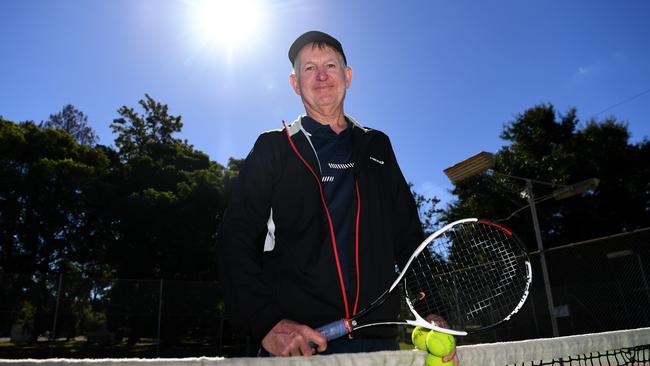
But the flame never quite went out. She stayed in touch with the sport by coaching with Joyce but there were no guarantees that the smouldering ashes of her professional career would ever again become the furnace they needed to be for her to thrive at the top level.
Joyce was coaching a schools clinic with Barty in 2015 when Wimbledon was on and he nonchalantly asked her one day whether she was watching it at home.
“Not really,’’ came her reply.
“It’s been on in the background at mum and dad’s house but I haven’t taken a lot of notice.’’
Joyce felt a sense of deflation. At that point she still seemed a disconnected world away from the professional game that always seemed her calling.
But there was one thing that neither Joyce, her parents or friends would not do … urge or demand she return to the circuit. There was simply no point. You can’t tell someone to re-fall in love with a game.
That said, Joyce didn’t mind playfully trying to nudge her in the right direction.
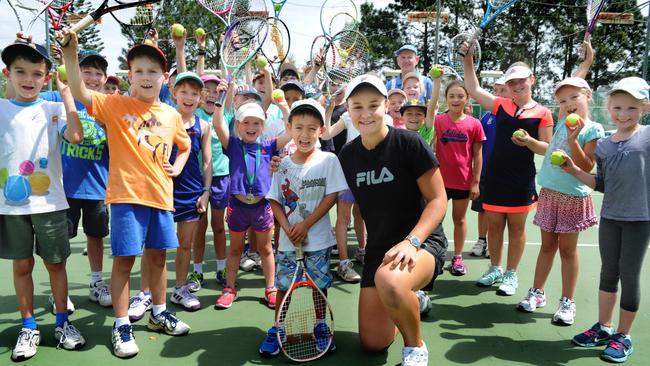
“We had an unbelievable meeting at my house. She then worked for me at schools all over the place and was doing about 25 hours a week. I had her coaching some oldies groups. I thought ‘I will wear her out. I will get her back on the circuit. I will get her to do all the jobs that other coaches would not do.’ But she just kept on coming back and saying ‘that was great … I really loved that’.
“My sister-in-law said to me ‘have a look at Ash down there with the juniors … she is leaning against the net telling them where to stand … how long do you think this will go on for?’”
THE HEAT IS ON
During her time out of the game Barty gained perspective on the privileges of her professional life.
During idle walks around Springfield she ran into some of her best school friends working at Woolworths or McDonalds saving up money to study at University.
In her last season before her self-imposed exile she had earned nearly $700,000 – a working life-time behind the checkout at Woolies.
She went fishing, had a house built near her parents, played with her dogs and shared birthday dinners with her sisters. The smaller the treats, the more she luxuriated in life’s simple pleasures.
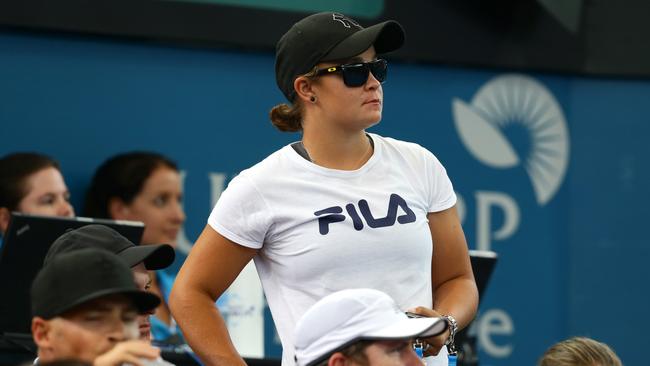
“She went back to being a normal person, going out with mates again,’’ Joyce said.
“Even just a simple thing like going to the Regatta Hotel with her friends. She liked that. She never had the chance to do something like that. She went to the races with me. Just acting normal.’’
Then came the switch no-one saw coming. Barty was asked to present to the Australian women’s cricket team in Brisbane and, suddenly impressed by the team vibe, said she would not mind having a hit.
It started out as a little bit of a laugh and ended up with a $3000 contract to join the Brisbane Heat.
“She had never really picked up a real bat and faced a real ball but when we chucked her into the nets and we fed about 150 balls into the bowling machine and she might have missed two and mis-hit maybe 10. I’ve not seen anything like it before or since,’’ said Heat coach of the time Andy Richards.
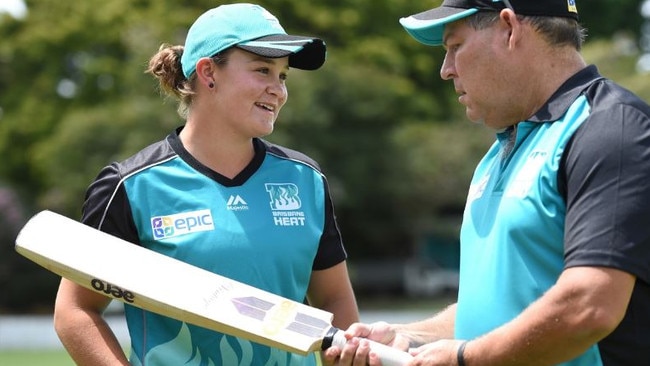
The Heat girls came to adore Barty but, as is customary in professional sport, when she first arrived from another code there was no sense she was jumping from red clay on to the red carpet.
“I still remember when she rocked up to training and thinking ‘who is that and why is she here?’’’ said the Heat’s Gemma Barsby.
“I tested her out a few times but the competitive side stepped up and it was really good. I can’t remember what I said but I remember she bit back and that really surprised me. That’s why we got along so well. We paid each other out but at the end of the day we had each other’s back.’’
Heat star Grace Harris was particularly interested in the Barty story because as young girls they were tennis squad partners.
“She was about five when I first played with her and she could already serve from the baseline,’’ Harris said.
“She was a freak even back then. She could slice and volley. She was not French Open good but she was a class above. She was beating girls in grade nine and 10 when she was in grade one.’’
SMELLS LIKE TEAM SPIRIT
The Heat girls quip they taught Barty not simply how to celebrate but how to commiserate.
“After our last game of the season in Adelaide we hit the town,’’ Harris said.
“She said ‘this would never happen in tennis. You get marching orders and notice when you have to vacate your apartment. You are on the next flight to the next competition. Then you have to find someone there you can have a hit with’. I said ‘welcome to a team sport. We are flying home late tomorrow so we can have a big night and sleep in’.”
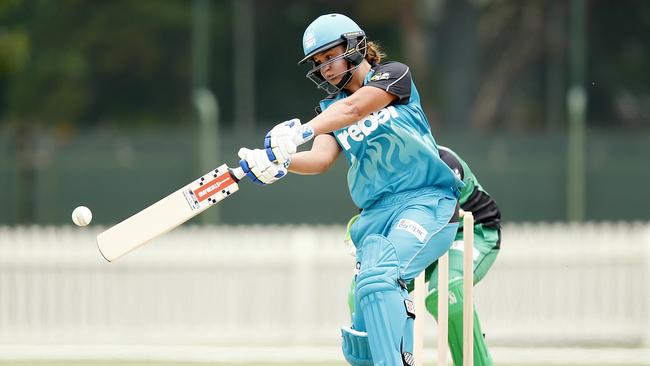
Soon after Barty won her French Open title, Harris sent her a touching message which finished with her asking Barty how many beers could she fit in the trophy.
Barty’s reply read: “Thanks Harry. An incredible day my friend. The little replica I got was the perfect size for a beer. I did not try the big one because it had a lot of clay in it.’’
Barty was the only tennis professional among the Heat brigade but allrounder Delissa Kimmence recalls one playful night in Brisbane when they all unofficially joined the circuit.
“We went to the Story Bridge Hotel and obviously people knew who she was. I remember a guy coming up and saying ‘what’s next girls?’ and we made up names and numbers and said we were off to the US Open as if we were tennis players – no name 100th seeds. She was so embarrassed but it was fun for us.’’
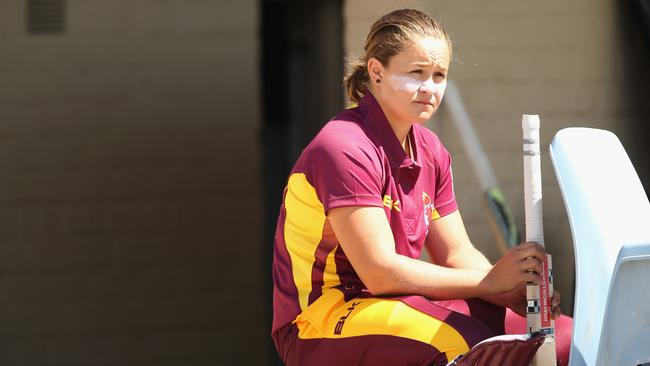
When Barty first arrived there were cricketers from other teams who asked Heat girls ‘how do you feel about her playing?’ but any resistance quickly melted away.
Kimmence said Barty won the girls over early at a pre-season training camp at the foot of the Darling Downs with her uncomplaining attitude and sense of team-work.
“I remember we went to Emu Gully and she could not believe she had never done anything like that before. She had never been in a team environment with other people. She was one of the girls who got stuck in and if you were hurting she was one of the girls talking. She was that person who got you through when there were tough times.’’
THE FIRE STILL BURNS
Inevitably, Barty’s cricket technique had droplets of tennis in it.
“She could catch. She could throw. She was not so good at catching half volleys which was not a surprise because in tennis often you catch it mid-air when they slam it back,’’ Harris said.
“It is a reaction thing. She had great hands though.
“Batting wise she could play the back of a length ball really well. She does not play the yorkers really well. That comes from tennis where you meet ball here (hip high). When she first picked up the cricket bat she just played everything cross bat – and smashed them – but if you pitched it up she was bowled or LBW. She would sweep the spinners.’’
Barty played nine matches of the Heat’s 14 WBBL games and had the team’s second highest strike rate of 109.67 batting in the middle order.
She played club cricket at Wests and despite the blissful anonymity of the local grade scene reducing the pressure, she still felt it.
When Harris sat down to watch the French Open final she made an observation that would surprise most sports fans who assume the greater the sporting occasion the greater the nerves.
“I felt she looked more nervous playing a club cricket game for Wests than she did in the French Open final.
“I watched her walked out. She once said to me ‘Grace when I get nervous this is what you will see’ and she pinched her arms. Yet she didn’t pinch her arms before that final. I reckon she was also more nervous than before her first Big Bash game than that final as well.
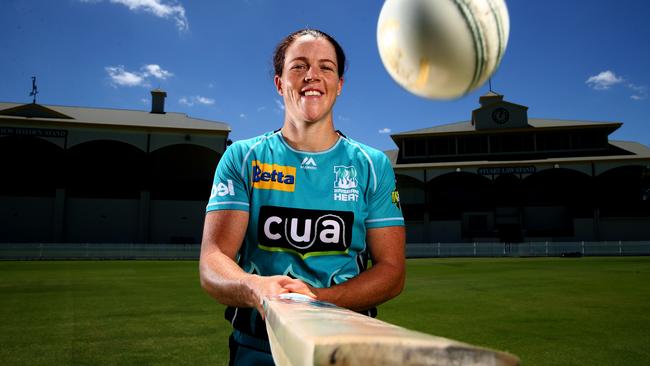
“Before she made her Big Bash debut she said she was so nervous she wanted to go out for a beer the night before to calm down.’’
Barty struck a sweet six at Melbourne’s Junction over and a quick century for Wests in highlights of her cricketing summer.
Then her heartstrings tacked again. After 18 months away from tennis she had a low key hit with Dellacqua on an outside court and felt a flicker turn into a flame.
“She decided to return to tennis and it wasn’t a shock to me to be honest,’’ Harris said.
“She has always loved tennis. She had a few of us around for drinks at her house and said ‘I went and had a hit the other day and I really enjoyed it. I am itching to get back. I am going back to the sport I love’.
“We just said ‘all power to you … go well’.”
LONELY NO MORE
Barty did not appear to shed tears when she won the French Open yet she cried when she left cricket.
“She was in tears when she told me she was going back to tennis,’’ Heat coach Richards said.
In typical Barty fashion there was no grand announcement. Her father realised she was making a comeback when he came home to the surprise sight of four boxes of tennis balls near the front door.
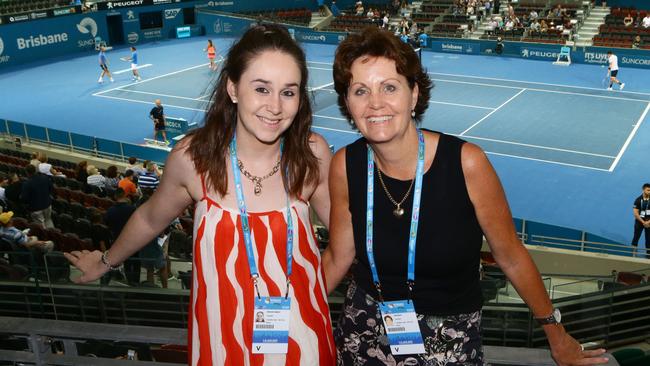
When she did go back on tour, steps were taken to ensure she was not the solitary figure she had been early in her career.
“We know how lonely she was,’’ Joyce said.
“But there are now things in place to counter that. After the US Open this year when she heads to the Asian tour one of her sisters Sarah will go with her and she has never travelled with her. Mum and dad are there now (in England). These days there are normally more people around her – a team. Now she has more friends on the circuit like CoCo Vandeweghe.’’
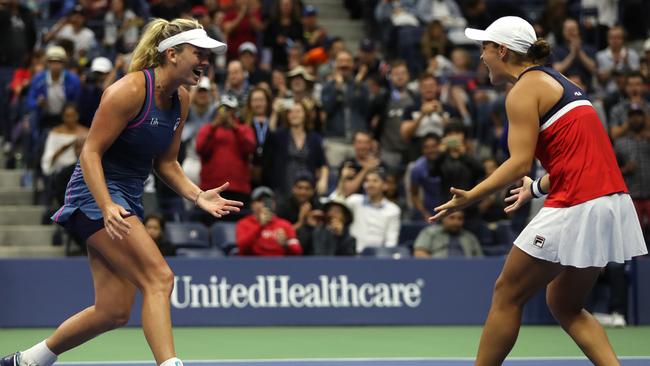
Refreshed, clear-headed and re-motivated, she climbed to the top of the world by winning the French Open and provided Australia with one of the most enchanting and uplifting stories of its sporting heritage.
Now, poignantly, she returns to Wimbledon not as a youngster turning her gaze away from the blinding spotlight but as one who has looked her challenges in the eye and stared them down.
She might just be primed for another Wimbledon title – and, if so, Cinderella will be staying for the ball to celebrate how a story beyond the reach of the most imaginative fairytale somehow came true.
PART I: The child prodigy who made the pros take notice
PART III TOMORROW: Vive le revolution – Rise of a champion

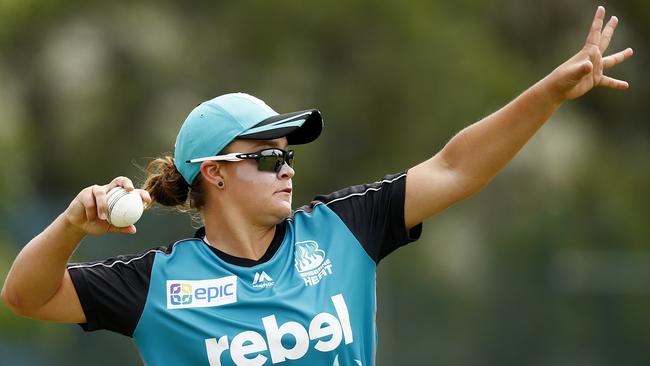
Add your comment to this story
To join the conversation, please log in. Don't have an account? Register
Join the conversation, you are commenting as Logout
World-famous singer makes pro tennis debut
He once vowed to never stop party rocking but it appears he hasn’t listened to his own advice, as the iconic singer made his professional tennis debut, aged 49.
Shock, tears as ex-world No. 1 retires on spot
A much-loved tennis champ’s career has ended in sad scenes when she grabbed a microphone on court and left spectators in tears.